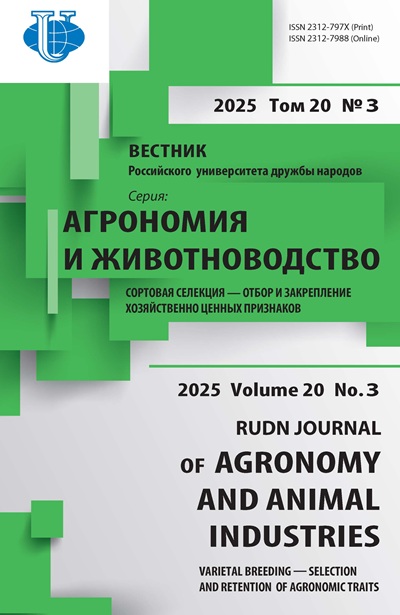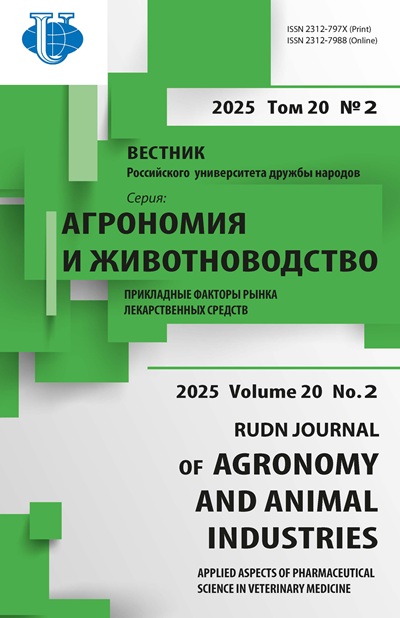The use of microbiological agents in potato growing in the zone affected by metallurgical production
- Authors: Ivanova S.V.1, Ryabchikova I.A.1
-
Affiliations:
- Irkutsk National Research Technical University
- Issue: Vol 20, No 2 (2025): Applied aspects of pharmaceutical science in veterinary medicine
- Pages: 263-273
- Section: Plant protection
- URL: https://agrojournal.rudn.ru/agronomy/article/view/20199
- DOI: https://doi.org/10.22363/2312-797X-2025-20-2-263-273
- EDN: https://elibrary.ru/NSGFCO
- ID: 20199
Cite item
Full Text
Abstract
The efficiency of using microbial agents for growing potatoes in the zone of influence of metallurgical production in the conditions of the Southern Baikal region was assessed. The studies were carried out at three sites near a large industrial aluminum enterprise in the city of Shelekhov in 2015-2016. Microbial agents of Japanese (EM series) and Russian production (Baikal EM1, Fitosporin) were used in the study. It was revealed that the effectiveness of Fitosporin and EM preparations depended to a greater extent on soil’s pH and weather conditions. Thus, growing potatoes on slightly acidic soils using EM agents caused a stable increase in yield by 14-22%, and on alkaline soils, increasing yields were recorded in less than 50% of cases. At the same time, using Fitosporin-M bioagent on alkaline soils resulted in increasing potato yield by 13…22%. Using this bioagent on slightly acidic soils increased yield (by 26%) only in 2016. The results obtained indicate the prospects of further research on the use of biological products in the cultivation of agricultural crops in contaminated areas.
Full Text
Table 1
Potato diseases at the end of tuber maturation stage two weeks before harvesting in 2015, % of leaf surface
Treatment variants | Plot 1 | Plot 2 | Plot 3 |
Watering (control) | 50 | 75 | More 50 |
Application of Fitosporin-M | Less 25 | 50 | 50 |
Application of Japanese EM preparation | Less 25 | 50 | 50 |
Application of Baikal EM‑1 | Less 50 | Less 75 | 50 |
Source: compiled by S.V. Ivanova, I.A. Ryabchikova.
Table 2
Productivity of potato tubers, kg/plant, in 2015
Treatment variants | Plot 1 | Plot 2 | Plot 3 |
Watering (control) | 1.03 ± 0.07 | 0.38 ± 0.03 | 0.78 ± 0.05 |
Application of Fitosporin-M | 1.29 ± 0.08 | 0.40 ± 0.05 | 0.95 ± 0.06 |
Application of Japanese EM preparation (1:1000) | 1.74 ± 0.08 | 0.48 ± 0.04 | 0.76 ± 0.06 |
Application of Baikal EM‑1 (1:1000) | 1.07 ± 0.11 | 0.49 ± 0.05 | 0.80 ± 0.08 |
Source: compiled by S.V. Ivanova, I.A. Ryabchikova.
Table 3
Potato diseases at the end of tuber maturation stage two weeks before harvesting in 2016, % of leaf surface
Treatment variants | Plot 1 | Plot 2 | Plot 3 |
Watering (control) | 75 | 100 | More 75 |
Application of Fitosporin-M | 75 | 100 | 75 |
Application of Japanese EM preparation | Less 75 | 100 | 75 |
Application of Baikal EM‑1 | 75 | 100 | 75 |
Source: compiled by S.V. Ivanova, I.A. Ryabchikova.
Table 4
Productivity of potato tubers, kg / plant, in 2016
Treatment variants | Plot 1 | Plot 2 | Plot 3 |
Watering (control) | 1.10 ± 0.02 | 0.36 ± 0.02 | 0.85 ± 0.09 |
Application of Fitosporin-M | 1.27 ± 0.08 | 0.49 ± 0.02 | 1.09 ± 0.10 |
Application of Baikal EM‑1 (1: 1000) | 1.43 ± 0,04 | 0.42 ± 0.03 | 0.90 ± 0.20 |
Application of Baikal EM‑1 (1:100) | 1.02 ± 0.03 | 0.45 ± 0.02 | 1.12 ± 0.22 |
Source: compiled by S.V. Ivanova, I.A. Ryabchikova.
About the authors
Svetlana V. Ivanova
Irkutsk National Research Technical University
Email: fotina.irk@gmail.com
ORCID iD: 0000-0003-2157-1817
SPIN-code: 9251-2085
PhD in Agricultural Sciences, Associate Professor, Department of Industrial Ecology and Life Safety
83 Lermontov st., Irkutsk, 664074, Russian FederationIrina A. Ryabchikova
Irkutsk National Research Technical University
Author for correspondence.
Email: rjabchik@bk.ru
ORCID iD: 0000-0001-9242-0018
SPIN-code: 2168-5791
PhD in Biology, Associate Professor, Department of Industrial Ecology and Life Safety
83 Lermontov st., Irkutsk, 664074, Russian FederationReferences
- Zabolotskikh VV, Tankih SN, Vasilyev AV. Technological approaches to detoxify and restore contaminated land. Izvestia of Samara Scientific Center of the Russian Academy of Sciences. 2018;20(5-3):341–351. (In Russ.). EDN: CZJRIY
- Ivenin AV, Mikhalev EV, Magomedkasumov AM. Application of biofertilizers in the cultivation of potatoes. Vestnik of Nizhny Novgorod state agricultural academy: Vestnik of Nizhny Novgorod state agricultural academy. 2012;(1):162–166. (In Russ.). EDN: TUUEEH
- Kirtaeva TN, Dudenko GA, Evseeva EA. The use of microbiopreparations with effective microorganisms in cultivation of cucumber under protected ground conditions. Agrarian Bulletin of Primorye. 2021;(1):9–13. (In Russ.). EDN: RADCGI
- Hu C, Qi Y. Long-term effective microorganisms application promote growth and increase yields and nutrition of wheat in China European. Journal of Agronomy. 2013;46:63–67. doi: 10.1016/j.eja.2012.12.003
- Quintella MC, Mata AMT, Lima LCP. Overview of bioremediation with technology assessment and emphasis on fungal bioremediation of oil contaminated soils. Journal of Environmental Management. 2019;241:156–166. doi: 10.1016/j.jenvman.2019.04.019
- Blinov VA, Ivanov AB. Study of the use of effective microorganisms for the purification of wastewater from ions of heavy metals. Water and ecology: problems and solutions. 2011;(2):57–60. (In Russ.). EDN: PLSIUH
- Tumanyan AF, Tyutyuma NV, Shcherbakova NA. Influence growth stimulants on productivity and fraction of tubers of different varieties of potatoes on light-brown soils lower Volga region. RUDN Journal of Agronomy and Animal Industries. 2014;(4):38–45. (In Russ.). doi: 10.22363/2312-979X‑2014-4-38-46 EDN: SYLZSN
- Chachina SB, Boltunova SV, Cherkashina NV. Degradation of petroleum hydrocarbons using microbial preparations "Baikal-EM", "Tamir", "East". Omsk Scientific Bulletin. 2015;(1):221–225. (In Russ.). EDN: UCRFGT
- Kim EI, Rykova LM. Influence of the preparation "Baikal EM‑1" on the yield and quality of potatoes and white cabbage. In: EM-technology. Reality and Prospects: conference proceedings. Ivanovo; 2002. p. 29–30. (In Russ.).
- Ivanova SV, Ivonina OY. EM technology for soil health and the production of environmentally friendly food. In: Food technologies, food quality and safety: conference proceedings. Irkutsk; 2006. p. 134–138. (In Russ.).
- Zababurin VA. Potato yield and quality depending on use biofertilizer "Baikal EM‑1". Bulliten of KSAU. 2006;(11):90–93. (In Russ.). EDN: KYHTZT
- Chernov AV, Dimitriev VL, Larkin SV. The influence of effective microorganism (EM) technology on the yield capacity of potato. Perm Agrarian Journal. 2018;(1):99–103. (In Russ.). EDN: YTIMAJ
- Belykh LI, Ryabchikova IA, Seryshev VA, Timofeeva SS, Penzina EE, Karpukova OM, et al. Assessing the chemical contamination of soil-plant cover in agroecosystems of the Southern Baikal region. Agrohimia. 2006;(5):78–89. (In Russ.). EDN: HVIXRD
- Filippov AV. Late blight of potatoes. Plant Protection and quarantine. 2012;(5):61–68. (In Russ.). EDN: SJTEFT
- Koltsova OM, Maraeva OB. Testing the ecological state of chernozem soils by the method of microbiological activity. In: Effective microorganisms — reality and prospects: conference proceedings. Voronezh; 2001. p.56–58. (In Russ.). EDN: UNQOZL
- Bulgadaeva RV, Nechesov IA, Dranishnikova AI, Shablin PA. On the history of the use of microbial drugs in agriculture. In: Effective microorganisms — reality and prospects: conference proceedings. Voronezh; 2001. p.14–16. (In Russ.).
Supplementary files















